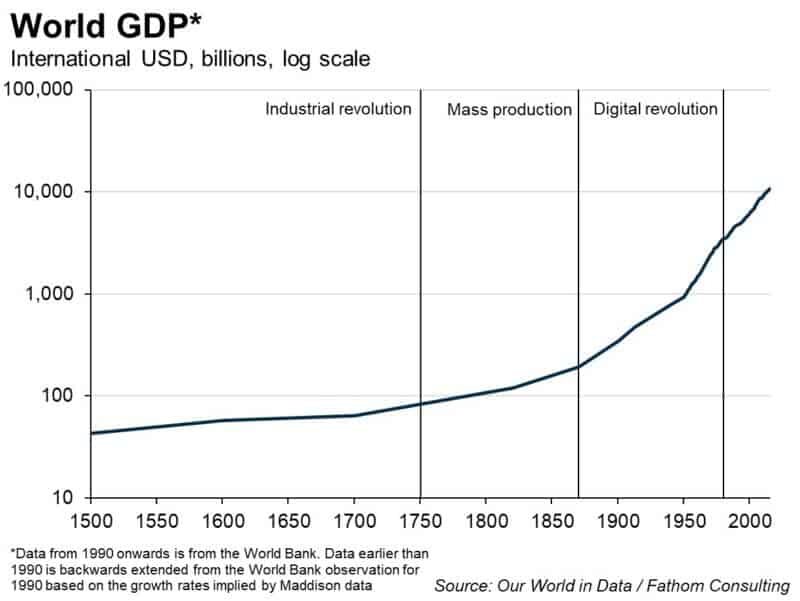A sideways look at economics
I made my final ever New Year’s resolution the other week — never to talk or speak about New Year’s resolutions again. So, for the first Thank Fathom it’s Friday blog of the year, it looked like I might be in a spot of bother finding a topical subject. But then I noticed the publication date — 6 January, celebrated across the Christian world as the Feast of the Epiphany. And so I thought — what on earth is an epiphany?
The Merriam Webster English Dictionary defines it as a sudden manifestation or perception of the essential nature or meaning of something; an intuitive grasp of reality through something such as an event, usually simple and striking; or an illuminating discovery, realisation, or disclosure. A pretty broad definition, and one that can be applied to both momentous events and personal realisations.
In Biblical tradition, the original epiphany occurred when the Magi — the three wise men — discovered the baby Jesus after their long trek following the Star of Bethlehem. (Where were the three wise women, I wonder? Maybe they got there earlier and moved on to other things — just a guess!)

Adoration of the Kings, by Gerard David | Source: Wikicommons
Of course, there were many other epiphanies in the world prior to the Biblical story. The discovery of fire would have been one. The invention of the first tool and then the wheel would have been others. And so on down the ages, including Archimedes’ famous “Eureka!” moment in the bathtub. Likewise, the moment the penny dropped for Sir Isaac Newton regarding gravity. Or was that an apple? Then there are the personal epiphanies — those moments when one finds an inner strength, or suddenly realises something that may change the course of a life.
Such epiphanies are harder to define in the world of economics, however. Changes in economic theory never come in a blinding flash in the bath, like Archimedes, or under the apple tree. They are built, theorised, developed and tested over many years, and often take decades to fully evolve and become recognised.
But there are moments of epiphany in world history that have notably improved our economic wellbeing. Indeed, ‘economic growth’ itself is a relatively new experience. Looking at the chart below of world GDP, the standard of living appears fairly constant until 1750, the birth of the Industrial Revolution in Britain. Society was transformed thanks to inventions such as the steam engine, that allowed goods that were formerly created by hand to be produced mechanically.

Another epiphany came on 1 December 1913, when Henry Ford installed the first moving assembly line for constructing an entire automobile, providing a pivotal moment in the era of mass production. A third, of course, is the arrival of the internet in 1980, commencing a digital revolution which has led right up to the very latest advances in artificial intelligence. Each of these innovations resulted in economic advances well beyond their original intention.
So, what will the next innovative epiphany be? And how might it affect the world economy? Maybe it has already happened.
On 5 December 2022, at the National Ignition Facility, part of the Lawrence Livermore National Laboratory in California, scientists achieved a breakthrough described by the US energy secretary, Jennifer Granholm, as “one of the most impressive scientific feats of the 21st century”.
For over 60 years, scientists have pursued the challenge of harnessing nuclear fusion, the process that powers the sun and stars. For the first time in those 60 years, they produced more energy than was put in, a condition known as ‘ignition’. The experiment involved an array of 192 lasers which fired 2.05 megajoules of energy at a tiny capsule containing deuterium and tritium (heavier forms of hydrogen). The capsule heats up, compresses and then implodes on itself, forcing the hydrogen atoms to fuse and release energy. In this case 3.15 megajoules of energy were produced — over 50% more than the energy put in. While this is only enough to boil a few kettles, the scale and importance of the achievement is potentially huge, and is one step closer to another major revolution — that is, one of clean energy.
This news could not come at a better time. For decades, world governments have been vacillating on the radical changes needed to quell the global rises in temperature. Any changes to date, though, seem somewhat underwhelming in the grand scale of things.
Nuclear fusion, if it can be successfully applied to energy provision, may just register as the epiphany that helps us save the earth from overheating through our reliance on fossil fuels. Fusion produces no CO2 or other substances harmful to the atmosphere, so the process itself does not contribute to greenhouse gas emissions or global warming.
Before we get our hopes up, however, although the reaction produced more energy than was put in to heat up the atomic nuclei, the lasers themselves required 300 megajoules of energy to produce the 2 megajoules’ worth of beam energy, suggesting a net burn of energy overall. There is also the economics of the matter to consider. The investment needed to make nuclear fusion commercially viable is expected to be astronomical, offering no comfort to those battling the consequences of climate change right now. Indeed, Tony Roulstone, a nuclear energy researcher at Cambridge University, said that this result is “a success for science, but it is still a long way from providing useful, abundant clean energy”.
In the short term, therefore, it may be that smaller fusion plants will be more feasible and that the energy they produce will merely add to that created by other renewable sources such as wind and solar. But that’s something at least.
If large scale nuclear fusion is eventually accelerated and available to all, it may mean massive changes to the economics of the future. So, watch this space.
Anyway, here’s hoping that 2023 can offer you some moment of epiphany, something that will greatly enhance your own personal journey. Happy New Year!
More by this author: